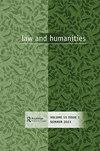呼吁法律保护:关于人们逃离迫害的伟大书籍教会了我们什么
IF 0.3
Q3 LAW
引用次数: 1
摘要
当谈到国家和国际法律秩序之间,以及脆弱的人性与国家机器之间的戏剧性冲突的例子时,很少有话题可以与遭受迫害的人的待遇相媲美。英国政府目前的政策是将乘坐小船抵达英国海岸的难民转移到卢旺达庇护系统,这至少与《难民公约》存在严重冲突:该政策从一开始就受到法律挑战,该政策将在2022年9月的高等法院以人权为由面临进一步挑战。在意大利,政府显然无视海上救援的国际义务,于2020年4月颁布法令,称由于COVID-19的影响,意大利港口对在地中海获救的移民下船是“不安全的”。在美国,特朗普政府于2020年3月援引了“第42条”这一公共卫生措施,有效地关闭了墨西哥、危地马拉、洪都拉斯和萨尔瓦多移民的边境,包括逃离迫害的移民。拜登政府试图取消第42条的努力在2022年5月被路易斯安那州联邦法院挫败,确保继续驱逐穿越美国南部边境或抵达入境口岸的移民,尽管疾病控制中心表示不再需要该措施。艺术和人文学科在这一领域的贡献的读者现在已经习惯了学者在民族国家主导的国际法律秩序中根据难民的“拥有权利的权利”来构建相关问题(这是一个典型的框架)本文章由计算机程序翻译,如有差异,请以英文原文为准。
Clamouring for legal protection: what the great books teach us about people fleeing from persecution
When it comes to examples of dramatic conflict between national and international legal orders, and between vulnerable humanity and the machinery of the state, there can be few topics to rival that of the treatment of people feeling persecution. The British government’s current policy of diverting refugees arriving on its shore in small boats into the Rwandan asylum system is at the very least in serious tension with the Refugee Convention: the subject of legal challenge from its very inception, the policy faces further challenge in the High Court in September 2022 on human rights grounds. In Italy, the government in apparent defiance of the international duty of rescue at sea, decreed in April 2020 that its ports were ‘unsafe’ for the disembarkation of migrants rescued in the Mediterranean Sea due to the impact of COVID-19. In the United States, the Trump administration in March 2020 invoked ‘Title 42’ a public health measure that effectively closed the border to migrants from Mexico, Guatemala, Honduras, and El Salvador including those fleeing persecution. The Biden administration’s attempt to lift Title 42 was thwarted in May 2022 by a Louisiana Federal Court, ensuring the continued removal of migrants crossing the United States’ southern border or arriving at ports of entry despite the Centers for Disease Control signalling that the measure is no longer necessary. Readers of arts and humanities contributions in this area are now used to scholars framing the relevant problem in terms of a refugee’s ‘right to have rights’ within an international legal order dominated by nation states (a framing typically
求助全文
通过发布文献求助,成功后即可免费获取论文全文。
去求助
来源期刊

Law and Humanities
LAW-
CiteScore
1.00
自引率
0.00%
发文量
21
期刊介绍:
Law and Humanities is a peer-reviewed journal, providing a forum for scholarly discourse within the arts and humanities around the subject of law. For this purpose, the arts and humanities disciplines are taken to include literature, history (including history of art), philosophy, theology, classics and the whole spectrum of performance and representational arts. The remit of the journal does not extend to consideration of the laws that regulate practical aspects of the arts and humanities (such as the law of intellectual property). Law and Humanities is principally concerned to engage with those aspects of human experience which are not empirically quantifiable or scientifically predictable. Each issue will carry four or five major articles of between 8,000 and 12,000 words each. The journal will also carry shorter papers (up to 4,000 words) sharing good practice in law and humanities education; reports of conferences; reviews of books, exhibitions, plays, concerts and other artistic publications.
 求助内容:
求助内容: 应助结果提醒方式:
应助结果提醒方式:


